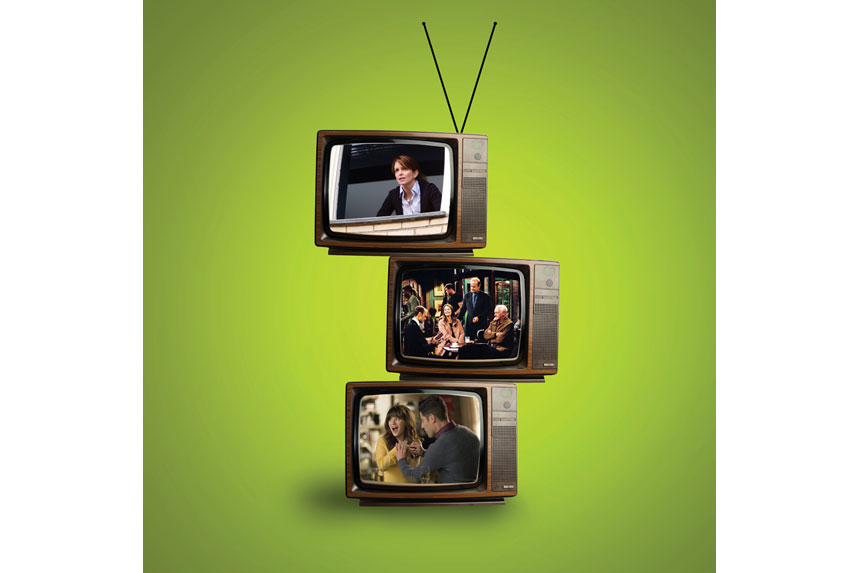It didn’t start out intentionally. A little 30 Rock to help me get out of bed in the morning. Some New Girl with dinner. A nightcap of Frasier (as others have written, it is the best show to go to sleep to).
It spiraled from there, an easy escape from what was becoming an increasingly rough year.
Ever since the sitcom emerged in the late 1940s, the format has offered a bulwark against reality.
The first sitcom, short for “situation comedy,” featured a real-life married couple. The domestic comedy, characterized by its screwball sensibilities, drew from the couple’s own experiences as newlyweds. (As Stearns later explained, “If Mary Kay got stuck in an elevator, it would give me an inspiration for us getting stuck in an elevator.”) By the time Mary Kay and Johnny wrapped in 1950, the early sitcom ecosystem was flourishing as adaptations of American radio comedy programs began making the leap from the airwaves to television, with shows like I Love Lucy and The Goldbergs establishing the familiar lexicon of the genre we know today.
From the beginning, there was a reassuring sameness to the narrative structure. Turn on an episode, and you knew what to expect; should you have to step out for a moment, you could trust that when you returned, you’d find the same familiar faces interacting together on screen, like no time at all had passed.
Most importantly in sitcoms, there’s an implicit understanding: Nothing will ever go that wrong. That’s because the sitcom is an episodic fantasy of life. Sure, the real-world peeks and prods at the edges of the sitcom universe, but you know that here a resolution will always be forthcoming in 30 minutes or less.
It’s what makes the sitcom such an ideal comfort watch. Or at least that’s what it’s been for me the past few months, after some unexpected health issues led me to spend a good chunk of it in bed.
It was when I found myself re-watching the same episode of Frasier for the third time in as many months that I started to realize just how swept up in sitcoms I had become.
The season four episode is classic Frasier, with a stream of jokes, including a setup where Frasier’s brother, Niles Crane, takes out a magazine advertisement in hopes of expanding his private psychiatry practice. The script was intended to read: Jung specialist servicing individuals, couples… groups… Satisfaction guaranteed… Tell me where it hurts.
Niles is played by David Hyde Pierce, whose comic instincts verge on poetic, and the punchline comes when he learns that the magazine got the copy wrong. Flustered, he storms into the room to tell Frasier what happened. Rather than “Jung specialist,” they’d printed “hung specialist.”
Without missing a beat, Frasier asks drolly, “Any calls?”
A white-faced Niles responds, “It’s a telethon.”
I could probably watch his delivery 100 times, and it would still make me smile.
Maybe, I told myself, this is me coping. Research does suggest that repeated exposure to positive distractions and familiar fiction can have beneficial health effects.
But it also felt a little too easy to get lost in this rosy glow of syndication — a gleam you can now live in in perpetuity, thanks to streaming.
It made me think about the late French sociologist Jean Baudrillard. Toward the end of the 20th century, he argued that society was losing the distinction between the cultural products we consume and the real-life things that they are based on. He didn’t point to the sitcom, but surely it’s an example of this — a simulacrum of American life. We’re watching a writers’ room’s idea of a make-believe U.S., drawing comfort from a false nostalgia of a world that was never really there in the first place.
The sitcom’s departure from reality is only becoming more pronounced with time. The genre has traditionally centered on the lives of “middle class” characters, but while the signifiers of class on television have always been aspirational, as the financial gulf widens between these characters and their real-life counterparts off screen, it has made sitcoms feel increasingly fantastical. For a point of comparison, at the start of the ’70s — the decade that brought us The Mary Tyler Moore Show, The Jeffersons, Laverne & Shirley, and the list goes on — 61 percent of American adults were considered middle class, according to Pew Research Center data; by 2015, amid rising inequality, only half of the population fit the definition.
This could be one of the reasons why, today, there’s such a demand out there for classic sitcoms. We can’t live these lives in the real world, so we can at least live them secondhand on screen.
The escape into sitcoms increased in the pandemic, with Nielson reporting a marked uptick in viewership during COVID’s height, noting that “when audiences needed a break from reality, they traveled back in time to tried-and-true picks like Friends, Family Matters, The Golden Girls, and Two and a Half Men.”
In an unprecedented moment that wiped away so many of the things that sitcoms promise — connection, community, stability — is it any surprise that more people sought the comfort of these fables of what life could look like?
It’s certainly what’s drawn me to them now.
I’ve come to think of this year as my year of sitcoms, to crib off the title of My Year of Rest and Relaxation, the Ottessa Moshfeghi novel that’s neither restful nor relaxing.
Like Moshfeghi’s heavily medicated narrator who tries to escape her life through sleep, I know on some level that I’m hiding away in the well-worn grooves of these characters’ healthy, happy fictions.
But the pull of the sitcom is seductive. Watching them can feel like living in a daydream. You’re staring across the screen at lives that, on the surface, seem like they could resemble your own, except here everything is shaped around human connection, and the worst thing that can happen to you is that you’ll learn a life lesson.
I know life is not a sitcom. But the more of them I watch, the more I wish we could take inspiration from the worlds they’ve imagined and bring the best of them into our own. Because all I know is that I’m not ready to wake up yet.
Jackie Mansky is a Los Angeles-based journalist and senior editor at Zócalo Public Square.
First appeared at Zócalo Public Square (zocalopublicsquare.org)
This article is featured in the July/August 2023 issue of The Saturday Evening Post. Subscribe to the magazine for more art, inspiring stories, fiction, humor, and features from our archives.
Become a Saturday Evening Post member and enjoy unlimited access. Subscribe now




Comments
enjoy watching METV for the Andy Griffith show and Matlock. MASH, etc. do not need to pay for You Tube to have a good time watching sitcoms snf light mysteries. they are also seen on other networks as well. Murder She Wrote is another goody, which as well as Monk are on all type of networks. watch my choice on Hallmark Movies and Mysteries. am a pre Boomer and wish there was more. avoid All In the Family on METV have seen all of it like I have MASH from start to finish originally, maybe All etc leaves something to be desired after you have seen it a couple of times from start to finish unlike the others. or just maybe it has something to do with at 80 having been thru so much in the last several years I need less political stuff in my entertainment. yes MASH is an anti war statement but it seems different, somehow.
Some interesting sitcom choices in your feature Jackie, and the comments. Never cared for Frasier, Two and a Half Men, The Golden Girls or Friends. Still, without the last two, there may not have been (the more sophisticated) The Designing Women or Caroline in the City, which I love. The Mary Tyler Moore Show goes without saying.
Bobby Lime made excellent points about Gracie Allen. The Burns and Allen show is definitely a favorite of mine, too. She and George are unfairly overlooked as the TV pioneers they were, with Lucy and Desi getting all the credit. BOTH couples were/are fantastic! George and Gracie were born in the mid-1890’s, giving them stronger ties to vaudeville, which they’d crafted and honed for years before incorporating it into their sitcom.
Bea Benaderet who was very funny as their neighbor Blanche, was originally Desi and Lucy’s first choice to play Ethel Mertz on their upcoming sitcom, but wasn’t available. It’s impossible to imagine anyone other than Viv in the role, but Bea would have been excellent too had things been different.
Green Acres is another favorite, and in some ways a successor to Burns and Allen with a similar vaudevillian dynamic between Eddie Albert and Eva Gabor. Absolutely priceless. Laugh-In also was a (later) mid-century TV comedy-variety show rooted in the vaudeville tradition of the early 20th. I still find it very funny to this day.
The Carol Burnett Show, of course. Sanford & Son, Maude, Bewitched? Fantastic! Almost unbelievable (but true) ‘Uncle Arthur’ was only in 10 episodes of the entire 8 season series. It’s too bad his own sitcom (The Paul Lynde Show ’72-73) wasn’t worthy of him. Not his fault at all, it was hastily put together by William Asher who was contractually obligated for a 9th season of Bewitched that was NOT to be (per divorce from Elizabeth Montgomery) as to not get sued royally by ABC.
Then there’s Lucy’s shows. Whether she’s Lucy Ricardo, Carmichael or Carter, there’s a series for whichever version of the character I want to see. Love all three of her series. Anyone who hasn’t seen The Lucy Show (1962-’68) or Here’s Lucy (’68-’74) featuring wonderful Lucie Arnaz, is missing out. If you like the 50’s to the early 70’s, have some laughs as you time travel back to those early post World World War II decades with Lucy!
You can’t beat watching Jack Benny, Andy Griffith, Dennis the Menace, and (yes) Friends and The Big Bang Theory.
Then, when I want to know what is really going on the world without slant I watch the National Desk.
Articles such as this make me feel my Boomerness. I agree, Frasier is classic, though it’s bittersweet for me because it’s a classic which could only have happened in an America which was already decadent. But make merry while civilization collapses around us, right? I think my favorite moment on Frasier was the show which, for a few moments, showed the characters’ interaction from the dog’s point of view.
When I think classic sitcoms, I think The Dick van Dyke Show. If there’s a less than inspired episode they turned out, I don’t remember it. And half the men my age fell hard for Mary Tyler Moore when we were in early puberty.
It dismays me, however, that almost nobody knows Burns and Allen anymore. Unless something has changed, just about all of the Burns and Allen shows are available free on YouTube. I haven’t checked lately, however.
Gracie Allen is without a doubt my favorite comedienne. Like Lucille Ball, who had that one character she could work for comic brilliance, Gracie Allen had only the Gracie Allen character. In their first days together, she played the straightwoman, while Burns played for the laughs. They quickly realized that it wasn’t working, and switched it around. Comedy gold. I’ve read and believe that Gracie Allen was the brains of the duo, that it was she who led the way and set the pace. She was adorable. She’s been dead since I was 12, yet I have something of a crush on her. No one was at all like her. That voice! And her matter of fact style of delivery, as though the loopiest things in the world were the most pedestrian, can’t be equaled. It’s said that she never broke character for any public appearance.
It’s not a sitcom, but The Carol Burnett Show has moments which are classic. Gracie Allen is my favorite comedienne, but Carol Burnett is probably the most talented. Lucille Ball gets all the huzzahs, but in one show, Carol Burnett would play three or four characters, brilliantly. If you don’t know her work and want an introduction, go to YouTube, and watch one of the Mr Tudball/Mrs Wiggins sketches with Tim Conway.
Also, they may be hard to run down, but here are two treasures from the past, The Jack Benny Show, and Topper. Jack Benny’s TV show was essentially his radio show which, since the 30s, had been one of the most beloved things in American entertainment, brought to TV. To say that the cast had chemistry and knowledge of how to work off one another is stating the obvious.
Topper to this day is considered by scholars to be still the champ in terms of sitcom brilliance. I remember it from reruns on a local TV station when I was 7. I couldn’t get home from school fast enough to watch it. It had great writers writing for it, among them, a very young Stephen Sondheim. It may not hold up too well to contemporary sensibilities, but it’s worth a search.
The champ, however, is Burns and Allen.
Oh yes: if you want to laugh your fundament off, watch anything with Groucho Marx from the You Bet Your Life show. I used to argue with a doctor of mine about who was the funniest American comic actor, Groucho or W.C. Fields. I still opt for Fields, because he was a brilliant physical comedian as well as a verbal one. Groucho was a marvelous physical comedian, too, but his bread and butter was the one liner. Fields died in 1946, and he certainly could not have done with a TV show what Groucho did, but thank God, we have Groucho. On radio, he was so quick witted that NBC insisted there be a several second delay in which they could intercept Groucho’s latest should it prove just a little too far across the line. They didn’t have that problem with TV, because the shows were filmed. On YouTube, there are compilations of such moments. They’re wonderful.
OMG – I think Jackie and I must somehow be living the same life. I, too, had a bad year, and found myself going to work and coming home and retreating to my streaming services. Along with Frazier, I binged Third Rock from the Sun and a few others. I think I have watched them from beginning to end at least three times. And, Like Jackie, when I have a bad day even now, I search ‘comedies’ and find something old to renew my energy. Loved this article.